Deck 2: Project Management
Question
Question
Question
Question
Question
Question
Question
Question
Question
Question
Question
Question
Question
Question
Question
Question
Question
Question
Question
Question
Question
Question
Question
Question
Question
Question
Question
Question
Question
Question
Question
Question
Question
Question
Question
Question
Question
Question
Question
Question
Question
Question
Question
Question
Question
Question
Question
Question
Question
Question
Question
Question
Question
Question
Question
Question
Question
Question
Question
Question
Question
Question
Question
Question
Question
Question
Question
Question
Question
Question
Question
Question
Question
Question
Question
Question
Question
Question
Question
Question

Unlock Deck
Sign up to unlock the cards in this deck!
Unlock Deck
Unlock Deck
1/151
Play
Full screen (f)
Deck 2: Project Management
1
A pure project organizational structure houses the project in a specific functional area.
False
2
The network diagram is a planning method that is designed to depict the relationships between activities.
True
3
Risk is a measure of the probability and consequences of not reaching a defined project goal.
True
4
A risk-management plan contains all identified risks to a project plus the ways that they can be circumvented.

Unlock Deck
Unlock for access to all 151 flashcards in this deck.
Unlock Deck
k this deck
5
Project managers should be able to organize a set of disparate activities.

Unlock Deck
Unlock for access to all 151 flashcards in this deck.
Unlock Deck
k this deck
6
A relationship that determines the sequence for undertaking activities is a precedence relationship.

Unlock Deck
Unlock for access to all 151 flashcards in this deck.
Unlock Deck
k this deck
7
The phase of project management that takes the most resources is the execution phase.

Unlock Deck
Unlock for access to all 151 flashcards in this deck.
Unlock Deck
k this deck
8
The earliest start time is never the same as the latest start time.

Unlock Deck
Unlock for access to all 151 flashcards in this deck.
Unlock Deck
k this deck
9
A critical path is any sequence of activities between a project's start and finish.

Unlock Deck
Unlock for access to all 151 flashcards in this deck.
Unlock Deck
k this deck
10
Projects often cut across organizational lines.

Unlock Deck
Unlock for access to all 151 flashcards in this deck.
Unlock Deck
k this deck
11
To obtain the latest start and latest finish time,we must work forward through the network.

Unlock Deck
Unlock for access to all 151 flashcards in this deck.
Unlock Deck
k this deck
12
A Gantt chart is a project schedule that superimposes project activities on a time line.

Unlock Deck
Unlock for access to all 151 flashcards in this deck.
Unlock Deck
k this deck
13
The normal cost is the amount of money it normally takes to complete an activity faster than its normal time.

Unlock Deck
Unlock for access to all 151 flashcards in this deck.
Unlock Deck
k this deck
14
Projects,and the application of project management,facilitate the implementation of operations strategy.

Unlock Deck
Unlock for access to all 151 flashcards in this deck.
Unlock Deck
k this deck
15
Project close out consists of a)completing the remaining deliverables and b)paying the final bills.

Unlock Deck
Unlock for access to all 151 flashcards in this deck.
Unlock Deck
k this deck
16
Scope creep is one of the primary causes of project failure.

Unlock Deck
Unlock for access to all 151 flashcards in this deck.
Unlock Deck
k this deck
17
A project manager should stop crashing a project if the time budget has been met or if the crash costs have exceeded the savings in indirect and penalty costs.

Unlock Deck
Unlock for access to all 151 flashcards in this deck.
Unlock Deck
k this deck
18
The work breakdown structure is a statement of all work that has to be completed.

Unlock Deck
Unlock for access to all 151 flashcards in this deck.
Unlock Deck
k this deck
19
A project is an interrelated set of activities that has a definite starting and ending point.

Unlock Deck
Unlock for access to all 151 flashcards in this deck.
Unlock Deck
k this deck
20
The optimistic time is the probable time required to perform the activity.

Unlock Deck
Unlock for access to all 151 flashcards in this deck.
Unlock Deck
k this deck
21
In a network diagram,an activity:
A)is the largest unit of work effort consuming both time and resources that a project manager can schedule and control.
B)is the smallest unit of work effort consuming both time and resources that a project manager can schedule and control.
C)should always be something the company has had experience with.
D)must always have a single,precise estimate for the time duration.
A)is the largest unit of work effort consuming both time and resources that a project manager can schedule and control.
B)is the smallest unit of work effort consuming both time and resources that a project manager can schedule and control.
C)should always be something the company has had experience with.
D)must always have a single,precise estimate for the time duration.

Unlock Deck
Unlock for access to all 151 flashcards in this deck.
Unlock Deck
k this deck
22
Fig.2.1 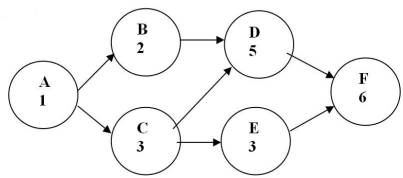
For the network shown in Fig.2.1,what is the project duration?
A)6
B)15
C)13
D)14

For the network shown in Fig.2.1,what is the project duration?
A)6
B)15
C)13
D)14

Unlock Deck
Unlock for access to all 151 flashcards in this deck.
Unlock Deck
k this deck
23
When using the beta distribution for estimating activity times:
A)an advantage is that the mode of the distribution is always equidistant from the end points of the distribution.
B)the most likely time estimate can be positioned anywhere between the optimistic and pessimistic time estimates.
C)we assume that the standard deviation is one-third the range between the optimistic and pessimistic time estimates.
D)the most likely time estimate becomes the mean of the distribution.
A)an advantage is that the mode of the distribution is always equidistant from the end points of the distribution.
B)the most likely time estimate can be positioned anywhere between the optimistic and pessimistic time estimates.
C)we assume that the standard deviation is one-third the range between the optimistic and pessimistic time estimates.
D)the most likely time estimate becomes the mean of the distribution.

Unlock Deck
Unlock for access to all 151 flashcards in this deck.
Unlock Deck
k this deck
24
Figure to accompany Table 2.1 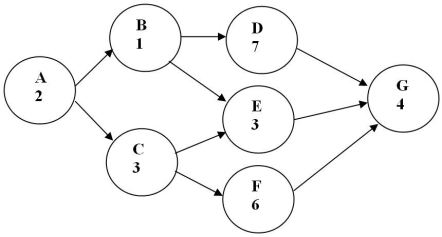 Table 2.1
Table 2.1
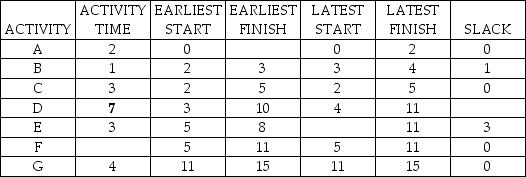
Using the information shown in Table 2.1,what is the activity time for activity F?
A)5
B)11
C)6
D)1
 Table 2.1
Table 2.1
Using the information shown in Table 2.1,what is the activity time for activity F?
A)5
B)11
C)6
D)1

Unlock Deck
Unlock for access to all 151 flashcards in this deck.
Unlock Deck
k this deck
25
Which one of the following best describes the critical path of a PERT/CPM network?
A)the sequence of activities between a project's start and finish that takes the longest time to complete
B)the sequence of activities between a project's start and finish that has the maximum amount of activity slack
C)the set of activities that has no precedence relationships
D)the sequence of activities that has the lowest normal activity cost
A)the sequence of activities between a project's start and finish that takes the longest time to complete
B)the sequence of activities between a project's start and finish that has the maximum amount of activity slack
C)the set of activities that has no precedence relationships
D)the sequence of activities that has the lowest normal activity cost

Unlock Deck
Unlock for access to all 151 flashcards in this deck.
Unlock Deck
k this deck
26
Figure to accompany Table 2.1  Table 2.1
Table 2.1

Using the information shown in Table 2.1,what is the earliest finish time for activity A?
A)0
B)2
C)3
D)4
 Table 2.1
Table 2.1
Using the information shown in Table 2.1,what is the earliest finish time for activity A?
A)0
B)2
C)3
D)4

Unlock Deck
Unlock for access to all 151 flashcards in this deck.
Unlock Deck
k this deck
27
Figure to accompany Table 2.1  Table 2.1
Table 2.1

Using the information shown in Table 2.1,what is the slack time for activity D?
A)1
B)4
C)6
D)7
 Table 2.1
Table 2.1
Using the information shown in Table 2.1,what is the slack time for activity D?
A)1
B)4
C)6
D)7

Unlock Deck
Unlock for access to all 151 flashcards in this deck.
Unlock Deck
k this deck
28
Activity slack is defined as:
A)latest start time minus earliest start time.
B)earliest start time minus latest start time.
C)earliest finish time minus latest finish time.
D)latest finish time minus earliest start time.
A)latest start time minus earliest start time.
B)earliest start time minus latest start time.
C)earliest finish time minus latest finish time.
D)latest finish time minus earliest start time.

Unlock Deck
Unlock for access to all 151 flashcards in this deck.
Unlock Deck
k this deck
29
Assume that activity G has the following times: Early start time = 7 days
Early finish time = 13 days
Late start time = 15 days
Late finish time = 21 days
Which of the following statements is TRUE about activity G?
A)Activity G takes 14 days to complete.
B)Activity G has a slack time of 8 days.
C)Activity G is on the critical path.
D)Activity G takes 2 days to complete.
Early finish time = 13 days
Late start time = 15 days
Late finish time = 21 days
Which of the following statements is TRUE about activity G?
A)Activity G takes 14 days to complete.
B)Activity G has a slack time of 8 days.
C)Activity G is on the critical path.
D)Activity G takes 2 days to complete.

Unlock Deck
Unlock for access to all 151 flashcards in this deck.
Unlock Deck
k this deck
30
Activity times for a project are estimated by all but which of the following methods?
A)Methods-Time Measurement (MTM)data,which includes predetermined time estimates for different activities
B)managerial opinions based on similar prior experiences
C)statistical methods based on actual past experience
D)estimates using learning curve models to improve replications and estimate accuracy
A)Methods-Time Measurement (MTM)data,which includes predetermined time estimates for different activities
B)managerial opinions based on similar prior experiences
C)statistical methods based on actual past experience
D)estimates using learning curve models to improve replications and estimate accuracy

Unlock Deck
Unlock for access to all 151 flashcards in this deck.
Unlock Deck
k this deck
31
Figure to accompany Table 2.1  Table 2.1
Table 2.1

Using the information shown in Table 2.1,what is the project duration?
A)15
B)14
C)12
D)10
 Table 2.1
Table 2.1
Using the information shown in Table 2.1,what is the project duration?
A)15
B)14
C)12
D)10

Unlock Deck
Unlock for access to all 151 flashcards in this deck.
Unlock Deck
k this deck
32
A project organization structure where team members are assigned to the project and work exclusively for the project manager is called:
A)a matrix structure.
B)a fixed structure.
C)a pure project structure.
D)a Functional structure.
A)a matrix structure.
B)a fixed structure.
C)a pure project structure.
D)a Functional structure.

Unlock Deck
Unlock for access to all 151 flashcards in this deck.
Unlock Deck
k this deck
33
Which one of these steps in implementing changes comes first?
A)document the process
B)evaluate performance
C)define scope
D)identify opportunity
A)document the process
B)evaluate performance
C)define scope
D)identify opportunity

Unlock Deck
Unlock for access to all 151 flashcards in this deck.
Unlock Deck
k this deck
34
Fig.2.1 
For the network shown in Fig.2.1,which of the following is the critical path?
A)ABCDEF
B)ABEF
C)ACDF
D)ACEF

For the network shown in Fig.2.1,which of the following is the critical path?
A)ABCDEF
B)ABEF
C)ACDF
D)ACEF

Unlock Deck
Unlock for access to all 151 flashcards in this deck.
Unlock Deck
k this deck
35
The project's objective statement should contain:
A)slack time and activities.
B)scope,time frame,and allocated resources.
C)manpower and methods.
D)activities,completion times,and incentives.
A)slack time and activities.
B)scope,time frame,and allocated resources.
C)manpower and methods.
D)activities,completion times,and incentives.

Unlock Deck
Unlock for access to all 151 flashcards in this deck.
Unlock Deck
k this deck
36
A project has three paths.A-B-C has a length of 25 days.A-D-C has a length of 15 days.Finally,A-E-C has a length of 20 days.Which one of the following statements is TRUE?
A)A-D-C is the critical path.
B)A-B-C has the most slack.
C)The expected duration of this project is 25 days.
D)The expected duration of this project is 25 + 15 + 20 = 60 days.
A)A-D-C is the critical path.
B)A-B-C has the most slack.
C)The expected duration of this project is 25 days.
D)The expected duration of this project is 25 + 15 + 20 = 60 days.

Unlock Deck
Unlock for access to all 151 flashcards in this deck.
Unlock Deck
k this deck
37
The earliest start time for an activity is equal to the:
A)smallest earliest finish time of all of its immediate predecessors.
B)largest earliest finish time of all of its immediate predecessors.
C)smallest late start time of any of its immediate predecessors.
D)largest late finish time of all of its immediate predecessors.
A)smallest earliest finish time of all of its immediate predecessors.
B)largest earliest finish time of all of its immediate predecessors.
C)smallest late start time of any of its immediate predecessors.
D)largest late finish time of all of its immediate predecessors.

Unlock Deck
Unlock for access to all 151 flashcards in this deck.
Unlock Deck
k this deck
38
In an activity-on-node [AON] network,the nodes represent ________,whereas the arcs represent ________.
A)activities;time
B)activities;precedence relationships
C)events;activities
D)precedence relationships;time
A)activities;time
B)activities;precedence relationships
C)events;activities
D)precedence relationships;time

Unlock Deck
Unlock for access to all 151 flashcards in this deck.
Unlock Deck
k this deck
39
Figure to accompany Table 2.1  Table 2.1
Table 2.1

Refer to the Figure to accompany Table 2.1.Which one of the following is the critical path?
A)ABDG
B)ABEG
C)ACEG
D)ACFG
 Table 2.1
Table 2.1
Refer to the Figure to accompany Table 2.1.Which one of the following is the critical path?
A)ABDG
B)ABEG
C)ACEG
D)ACFG

Unlock Deck
Unlock for access to all 151 flashcards in this deck.
Unlock Deck
k this deck
40
Figure to accompany Table 2.1  Table 2.1
Table 2.1

Using the information shown in Table 2.1,what is the latest start time for activity E?
A)2
B)3
C)5
D)8
 Table 2.1
Table 2.1
Using the information shown in Table 2.1,what is the latest start time for activity E?
A)2
B)3
C)5
D)8

Unlock Deck
Unlock for access to all 151 flashcards in this deck.
Unlock Deck
k this deck
41
Table 2.5 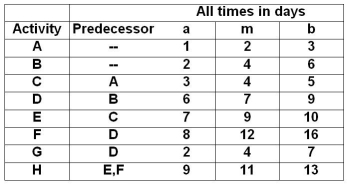
Using Table 2.5,the expected time for activity C is:
A)three days.
B)four days.
C)five days.
D)more than five days.

Using Table 2.5,the expected time for activity C is:
A)three days.
B)four days.
C)five days.
D)more than five days.

Unlock Deck
Unlock for access to all 151 flashcards in this deck.
Unlock Deck
k this deck
42
Which one of the following conditions violates the assumptions of PERT/CPM networks?
A)Some activities can have zero variance.
B)Costs increase linearly as activity time is reduced below its normal time.
C)Two activities tied together by an arc are overlapping and can be worked on simultaneously.
D)There can be more than one critical path in a network.
A)Some activities can have zero variance.
B)Costs increase linearly as activity time is reduced below its normal time.
C)Two activities tied together by an arc are overlapping and can be worked on simultaneously.
D)There can be more than one critical path in a network.

Unlock Deck
Unlock for access to all 151 flashcards in this deck.
Unlock Deck
k this deck
43
Table 2.2 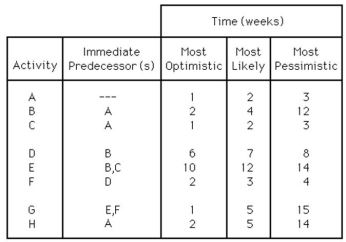
Using Table 2.2,what is the earliest expected time of completion of the whole project?
A)fewer than or equal to 19 weeks
B)greater than 19 but fewer than or equal to 21 weeks
C)greater than 21 but fewer than or equal to 24 weeks
D)greater than 24 weeks

Using Table 2.2,what is the earliest expected time of completion of the whole project?
A)fewer than or equal to 19 weeks
B)greater than 19 but fewer than or equal to 21 weeks
C)greater than 21 but fewer than or equal to 24 weeks
D)greater than 24 weeks

Unlock Deck
Unlock for access to all 151 flashcards in this deck.
Unlock Deck
k this deck
44
Table 2.4
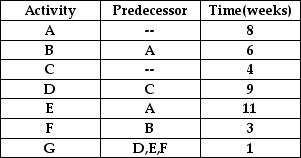
Using Table 2.4,what is the earliest completion time for this project?
A)18 weeks
B)19 weeks
C)20 weeks
D)21 weeks

Using Table 2.4,what is the earliest completion time for this project?
A)18 weeks
B)19 weeks
C)20 weeks
D)21 weeks

Unlock Deck
Unlock for access to all 151 flashcards in this deck.
Unlock Deck
k this deck
45
Table 2.3 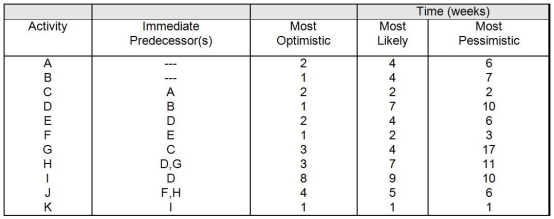
Using Table 2.3,which activity is on the critical path?
A)Activity D
B)Activity F
C)Activity G
D)Activity K

Using Table 2.3,which activity is on the critical path?
A)Activity D
B)Activity F
C)Activity G
D)Activity K

Unlock Deck
Unlock for access to all 151 flashcards in this deck.
Unlock Deck
k this deck
46
Table 2.4

Using Table 2.4,what is the largest amount of slack that any activity in the project has?
A)zero weeks
B)two weeks
C)four weeks
D)six weeks

Using Table 2.4,what is the largest amount of slack that any activity in the project has?
A)zero weeks
B)two weeks
C)four weeks
D)six weeks

Unlock Deck
Unlock for access to all 151 flashcards in this deck.
Unlock Deck
k this deck
47
To calculate the probability of completing a project by a certain date:
A)the expected completion time of the project is taken to be the sum of the activity times on the shortest path.
B)the variance of the distribution of project completion times is taken to be one-sixth the difference between the latest finish time and the earliest finish time of the last activity in the project.
C)we assume that the activity durations are independent of each other so that the normal distribution can be used.
D)we need only the parameters of the beta distribution for the finish node of the diagram.
A)the expected completion time of the project is taken to be the sum of the activity times on the shortest path.
B)the variance of the distribution of project completion times is taken to be one-sixth the difference between the latest finish time and the earliest finish time of the last activity in the project.
C)we assume that the activity durations are independent of each other so that the normal distribution can be used.
D)we need only the parameters of the beta distribution for the finish node of the diagram.

Unlock Deck
Unlock for access to all 151 flashcards in this deck.
Unlock Deck
k this deck
48
Table 2.4

Using Table 2.4,what is the early start time for activity D?
A)week 9
B)week 4
C)week 7
D)week 0

Using Table 2.4,what is the early start time for activity D?
A)week 9
B)week 4
C)week 7
D)week 0

Unlock Deck
Unlock for access to all 151 flashcards in this deck.
Unlock Deck
k this deck
49
Table 2.4

Using Table 2.4,what is the minimum number of activities that would have to be crashed to cause a decrease in the project's earliest completion date?
A)one activity
B)two activities
C)three activities
D)four or more activities

Using Table 2.4,what is the minimum number of activities that would have to be crashed to cause a decrease in the project's earliest completion date?
A)one activity
B)two activities
C)three activities
D)four or more activities

Unlock Deck
Unlock for access to all 151 flashcards in this deck.
Unlock Deck
k this deck
50
In making an estimate of the most pessimistic time for an activity,a manager deliberately estimates this time too high (i.e. ,longer than it should be).What is the result of this action,assuming the beta distribution is being used to make time estimates?
A)The most likely time for this activity will be larger than it should be.
B)The variance of the activity will be smaller than it should be.
C)The beta distribution will be symmetric around its mean.
D)The expected time for this activity will be larger than it should be.
A)The most likely time for this activity will be larger than it should be.
B)The variance of the activity will be smaller than it should be.
C)The beta distribution will be symmetric around its mean.
D)The expected time for this activity will be larger than it should be.

Unlock Deck
Unlock for access to all 151 flashcards in this deck.
Unlock Deck
k this deck
51
Table 2.2 
Using Table 2.2,if the expected times for activities A,G,and H increased by 2,3,and 4 weeks,respectively,by how many weeks would the project's earliest expected time of completion increase?
A)fewer than or equal to 2 weeks
B)greater than 2 weeks but fewer than or equal to 4 weeks
C)greater than 4 weeks but fewer than or equal to 6 weeks
D)greater than 6 weeks

Using Table 2.2,if the expected times for activities A,G,and H increased by 2,3,and 4 weeks,respectively,by how many weeks would the project's earliest expected time of completion increase?
A)fewer than or equal to 2 weeks
B)greater than 2 weeks but fewer than or equal to 4 weeks
C)greater than 4 weeks but fewer than or equal to 6 weeks
D)greater than 6 weeks

Unlock Deck
Unlock for access to all 151 flashcards in this deck.
Unlock Deck
k this deck
52
Table 2.3 
Using Table 2.3,if the project manager wants at least a 98% probability that the project will be completed on or before the due date,what is the shortest project due date that will satisfy the manager?
A)fewer than or equal to 28 days
B)greater than 28 days but fewer than or equal to 30 days
C)greater than 30 days but fewer than or equal to 32 days
D)greater than 32 days

Using Table 2.3,if the project manager wants at least a 98% probability that the project will be completed on or before the due date,what is the shortest project due date that will satisfy the manager?
A)fewer than or equal to 28 days
B)greater than 28 days but fewer than or equal to 30 days
C)greater than 30 days but fewer than or equal to 32 days
D)greater than 32 days

Unlock Deck
Unlock for access to all 151 flashcards in this deck.
Unlock Deck
k this deck
53
Which one of the following statements regarding Figure 2.2 is TRUE?
A)Activity S cannot finish until activity T finishes.
B)Activity T cannot begin until activity U is completed.
C)Activity U cannot begin until activities S and T have been completed.
D)Activity V cannot begin until activity S has been completed.
Answer: C
Reference: Planning Projects
Difficulty: Moderate
Keywords: activity precedence
If a project has exactly one critical path,which one of the following statements is TRUE?
A)Crashing an activity on the critical path will always result in an increase in total project profits.
B)Activities on the critical path cannot be crashed.
C)Crashing an activity on the critical path will always result in a reduced total project completion time.
D)The best schedule is one in which all activities are crashed as much as possible.
A)Activity S cannot finish until activity T finishes.
B)Activity T cannot begin until activity U is completed.
C)Activity U cannot begin until activities S and T have been completed.
D)Activity V cannot begin until activity S has been completed.
Answer: C
Reference: Planning Projects
Difficulty: Moderate
Keywords: activity precedence
If a project has exactly one critical path,which one of the following statements is TRUE?
A)Crashing an activity on the critical path will always result in an increase in total project profits.
B)Activities on the critical path cannot be crashed.
C)Crashing an activity on the critical path will always result in a reduced total project completion time.
D)The best schedule is one in which all activities are crashed as much as possible.

Unlock Deck
Unlock for access to all 151 flashcards in this deck.
Unlock Deck
k this deck
54
Table 2.3 
Using Table 2.3,what is the earliest expected time of completion of the whole project?
A)fewer than or equal to 21 days
B)greater than 21 but fewer than or equal to 22 days
C)greater than 22 but fewer than or equal to 23 days
D)greater than 23 days

Using Table 2.3,what is the earliest expected time of completion of the whole project?
A)fewer than or equal to 21 days
B)greater than 21 but fewer than or equal to 22 days
C)greater than 22 but fewer than or equal to 23 days
D)greater than 23 days

Unlock Deck
Unlock for access to all 151 flashcards in this deck.
Unlock Deck
k this deck
55
Table 2.4

Using Table 2.4,what is the minimum number of activities that would have to be delayed to cause an increase in the project's earliest completion date?
A)one activity
B)two activities
C)three activities
D)four or more activities

Using Table 2.4,what is the minimum number of activities that would have to be delayed to cause an increase in the project's earliest completion date?
A)one activity
B)two activities
C)three activities
D)four or more activities

Unlock Deck
Unlock for access to all 151 flashcards in this deck.
Unlock Deck
k this deck
56
Table 2.3 
Using Table 2.3,if the project is due to be completed in 28 days,what is the probability that the project will be completed on or before the due date?
A)less than or equal to 75%
B)greater than 75% but less than or equal to 85%
C)greater than 85% but less than or equal to 95%
D)greater than 95%

Using Table 2.3,if the project is due to be completed in 28 days,what is the probability that the project will be completed on or before the due date?
A)less than or equal to 75%
B)greater than 75% but less than or equal to 85%
C)greater than 85% but less than or equal to 95%
D)greater than 95%

Unlock Deck
Unlock for access to all 151 flashcards in this deck.
Unlock Deck
k this deck
57
Following are four sets of most optimistic,most likely,and most pessimistic times (in weeks)for an activity.Which one of the four sets will have a mean estimated time equal to the most likely time?
A)1,9,9
B)1,5,9
C)1,1,9
D)1,5,5
A)1,9,9
B)1,5,9
C)1,1,9
D)1,5,5

Unlock Deck
Unlock for access to all 151 flashcards in this deck.
Unlock Deck
k this deck
58
Table 2.4

Using Table 2.4,what is the slack associated with activity B?
A)1 week
B)2 weeks
C)3 weeks
D)None of these is the correct activity slack for B.

Using Table 2.4,what is the slack associated with activity B?
A)1 week
B)2 weeks
C)3 weeks
D)None of these is the correct activity slack for B.

Unlock Deck
Unlock for access to all 151 flashcards in this deck.
Unlock Deck
k this deck
59
Table 2.2 
Using Table 2.2,which activity will have the largest amount of slack?
A)Activity F
B)Activity C
C)Activity H
D)Activity A

Using Table 2.2,which activity will have the largest amount of slack?
A)Activity F
B)Activity C
C)Activity H
D)Activity A

Unlock Deck
Unlock for access to all 151 flashcards in this deck.
Unlock Deck
k this deck
60
Table 2.4

Using Table 2.4,what is the latest finish time for activity C?
A)week 4
B)week 6
C)week 8
D)week 10

Using Table 2.4,what is the latest finish time for activity C?
A)week 4
B)week 6
C)week 8
D)week 10

Unlock Deck
Unlock for access to all 151 flashcards in this deck.
Unlock Deck
k this deck
61
Table 2.8
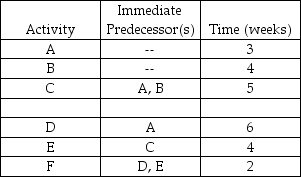
Using Table 2.8,what is the earliest completion time of the project?
A)fewer than or equal to 10 weeks
B)greater than 16 weeks
C)greater than 13 weeks but fewer than or equal to 16 weeks

Using Table 2.8,what is the earliest completion time of the project?
A)fewer than or equal to 10 weeks
B)greater than 16 weeks
C)greater than 13 weeks but fewer than or equal to 16 weeks

Unlock Deck
Unlock for access to all 151 flashcards in this deck.
Unlock Deck
k this deck
62
Figure to accompany Table 2.9 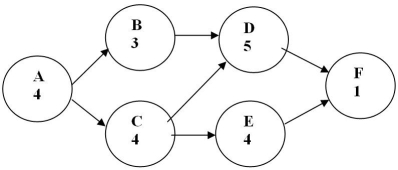 Table 2.9
Table 2.9

How many week(s)of crashing are available for activity B in Table 2.9?
A)0
B)1
C)2
D)3
 Table 2.9
Table 2.9
How many week(s)of crashing are available for activity B in Table 2.9?
A)0
B)1
C)2
D)3

Unlock Deck
Unlock for access to all 151 flashcards in this deck.
Unlock Deck
k this deck
63
Table 2.8

Using Table 2.8,what is the critical path of the above project?
A)B-C-E-F
B)B-C-F
C)A-D-F
D)A-C-E-F

Using Table 2.8,what is the critical path of the above project?
A)B-C-E-F
B)B-C-F
C)A-D-F
D)A-C-E-F

Unlock Deck
Unlock for access to all 151 flashcards in this deck.
Unlock Deck
k this deck
64
Table 2.7
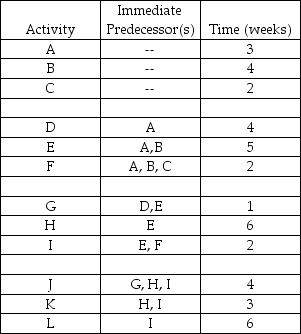
Using Table 2.7,what is the latest start time for activity A?
A)day 0
B)day 1
C)day 2
D)day 3 or later

Using Table 2.7,what is the latest start time for activity A?
A)day 0
B)day 1
C)day 2
D)day 3 or later

Unlock Deck
Unlock for access to all 151 flashcards in this deck.
Unlock Deck
k this deck
65
Table 2.5 
Using Table 2.5,what is the latest finish time for activity D?
A)between 4 and 6 days
B)between 6 and 8 days
C)between 8 and 10 days
D)more than 10 days

Using Table 2.5,what is the latest finish time for activity D?
A)between 4 and 6 days
B)between 6 and 8 days
C)between 8 and 10 days
D)more than 10 days

Unlock Deck
Unlock for access to all 151 flashcards in this deck.
Unlock Deck
k this deck
66
Table 2.6
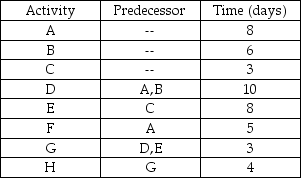
Disaster strikes and activity F takes 20 days instead of the anticipated 5 days.Using Table 2.6,how much longer will the project last than initially estimated?
A)15 days
B)0 days
C)7 days
D)3 days

Disaster strikes and activity F takes 20 days instead of the anticipated 5 days.Using Table 2.6,how much longer will the project last than initially estimated?
A)15 days
B)0 days
C)7 days
D)3 days

Unlock Deck
Unlock for access to all 151 flashcards in this deck.
Unlock Deck
k this deck
67
Table 2.6

Using Table 2.6,what is the earliest completion time of this project?
A)23 days
B)25 days
C)27 days
D)29 days

Using Table 2.6,what is the earliest completion time of this project?
A)23 days
B)25 days
C)27 days
D)29 days

Unlock Deck
Unlock for access to all 151 flashcards in this deck.
Unlock Deck
k this deck
68
Table 2.6

Using Table 2.6,what is the earliest that activity D can be finished?
A)18 days
B)8 days
C)13 days
D)25 days

Using Table 2.6,what is the earliest that activity D can be finished?
A)18 days
B)8 days
C)13 days
D)25 days

Unlock Deck
Unlock for access to all 151 flashcards in this deck.
Unlock Deck
k this deck
69
Table 2.6

Using Table 2.6,every day the construction crew is on-site costs $1000.What activities would you consider crashing to reduce the project completion cost?
A)Activity E
B)Activity F
C)Activity G
D)All of these activities would be candidates for crashing.

Using Table 2.6,every day the construction crew is on-site costs $1000.What activities would you consider crashing to reduce the project completion cost?
A)Activity E
B)Activity F
C)Activity G
D)All of these activities would be candidates for crashing.

Unlock Deck
Unlock for access to all 151 flashcards in this deck.
Unlock Deck
k this deck
70
Figure to accompany Table 2.9  Table 2.9
Table 2.9

Determine the information missing from Table 2.9;then answer the following questions.How many week(s)of crashing are available for activity D in Table 2.9?
A)0
B)1
C)2
D)6
 Table 2.9
Table 2.9
Determine the information missing from Table 2.9;then answer the following questions.How many week(s)of crashing are available for activity D in Table 2.9?
A)0
B)1
C)2
D)6

Unlock Deck
Unlock for access to all 151 flashcards in this deck.
Unlock Deck
k this deck
71
Table 2.5 
Using Table 2.5,which activity is on the critical path?
A)Activity A
B)Activity C
C)Activity E
D)Activity H

Using Table 2.5,which activity is on the critical path?
A)Activity A
B)Activity C
C)Activity E
D)Activity H

Unlock Deck
Unlock for access to all 151 flashcards in this deck.
Unlock Deck
k this deck
72
Table 2.7

Using Table 2.7,suppose activity D can be shortened from four days to one day.Assume all other activity times remain the same.How much shorter will the total project earliest completion time become?
A)zero days
B)one day
C)two days
D)three days

Using Table 2.7,suppose activity D can be shortened from four days to one day.Assume all other activity times remain the same.How much shorter will the total project earliest completion time become?
A)zero days
B)one day
C)two days
D)three days

Unlock Deck
Unlock for access to all 151 flashcards in this deck.
Unlock Deck
k this deck
73
Table 2.6

Using Table 2.6,how many days can activity C be delayed without changing the whole project's earliest completion time?
A)0 days
B)2 days
C)5 days
D)7 days

Using Table 2.6,how many days can activity C be delayed without changing the whole project's earliest completion time?
A)0 days
B)2 days
C)5 days
D)7 days

Unlock Deck
Unlock for access to all 151 flashcards in this deck.
Unlock Deck
k this deck
74
Table 2.5 
Using Table 2.5,what is the variance for activity F?
A)1.33
B)1.78
C)2.34
D)2.69

Using Table 2.5,what is the variance for activity F?
A)1.33
B)1.78
C)2.34
D)2.69

Unlock Deck
Unlock for access to all 151 flashcards in this deck.
Unlock Deck
k this deck
75
Table 2.6

Using Table 2.6,what is the latest start time for activity E?
A)day 8
B)day 10
C)day 12
D)day 14

Using Table 2.6,what is the latest start time for activity E?
A)day 8
B)day 10
C)day 12
D)day 14

Unlock Deck
Unlock for access to all 151 flashcards in this deck.
Unlock Deck
k this deck
76
Table 2.8

Using Table 2.8,what is the slack for activity A?
A)0 weeks
B)1 week
C)2 weeks
D)3 or more weeks

Using Table 2.8,what is the slack for activity A?
A)0 weeks
B)1 week
C)2 weeks
D)3 or more weeks

Unlock Deck
Unlock for access to all 151 flashcards in this deck.
Unlock Deck
k this deck
77
Figure to accompany Table 2.9  Table 2.9
Table 2.9

What is the critical path for the project shown in the above network and Table 2.9,using the normal times?
A)A-B-D-F
B)A-C-D-F
C)A-C-E-F
D)A-B-C-D-E-F
 Table 2.9
Table 2.9
What is the critical path for the project shown in the above network and Table 2.9,using the normal times?
A)A-B-D-F
B)A-C-D-F
C)A-C-E-F
D)A-B-C-D-E-F

Unlock Deck
Unlock for access to all 151 flashcards in this deck.
Unlock Deck
k this deck
78
Table 2.7

Using Table 2.7,suppose activity I is delayed,taking eight days to complete instead of two days.Assume all other activity times remain the same.How much longer will the total project earliest completion time become?
A)zero days
B)one or two days
C)three or four days
D)five or six days

Using Table 2.7,suppose activity I is delayed,taking eight days to complete instead of two days.Assume all other activity times remain the same.How much longer will the total project earliest completion time become?
A)zero days
B)one or two days
C)three or four days
D)five or six days

Unlock Deck
Unlock for access to all 151 flashcards in this deck.
Unlock Deck
k this deck
79
Table 2.7

Using Table 2.7,what is the critical path for this project?
A)B-E-H-K
B)B-E-H-J
C)A-E-G-J
D)C-F-I-L

Using Table 2.7,what is the critical path for this project?
A)B-E-H-K
B)B-E-H-J
C)A-E-G-J
D)C-F-I-L

Unlock Deck
Unlock for access to all 151 flashcards in this deck.
Unlock Deck
k this deck
80
Table 2.5 
Using Table 2.5,what is the standard deviation for the entire project?
A)1.08
B)1.17
C)1.71
D)2.92

Using Table 2.5,what is the standard deviation for the entire project?
A)1.08
B)1.17
C)1.71
D)2.92

Unlock Deck
Unlock for access to all 151 flashcards in this deck.
Unlock Deck
k this deck


